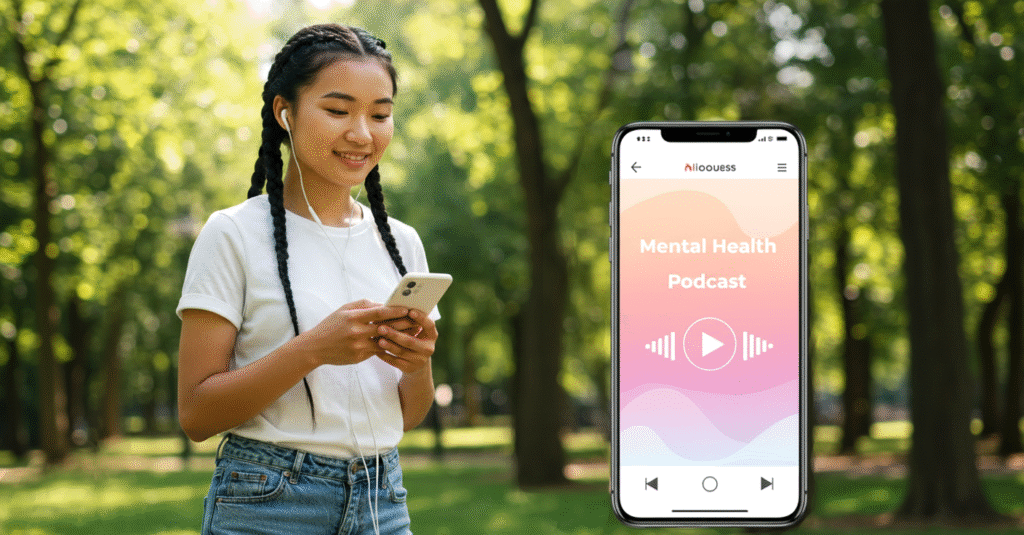Why Mental Health Podcasts Are a Lifeline Today
Imagine this: you’re stuck in traffic, scrubbing dishes, or taking an evening walk. Instead of background noise or doomscrolling, you press play. Suddenly, a therapist, neuroscientist, or fellow traveler in the mental health journey is speaking with you directly—sharing practical techniques, hard-won stories, and science-backed tools. That’s the quiet revolution of mental health podcasts.
By 2025, podcasts have morphed into much more than entertainment. They’ve become coping resources, portable therapy allies, and peer-support spaces. The global audience is projected to reach 584.1 million listeners (Statista, 2024), and the wellness podcast category alone has grown more than 42% over the past four years.
The numbers spotlight their influence:
- Over 90% of listeners report podcasts positively impact their mental health.
- 77% say they discuss episodes with others, turning solitary listening into community conversation.
- Shows are increasingly part of daily self-care—nearly half of health/wellness podcast fans spend more time with them now than even a year ago.
With millions of podcasts out there, though, the big question becomes: Which ones are genuinely supportive and how do you pick the right fit? This guide answers that—from the best mental health podcasts of 2025 to evidence on their effectiveness, to the very practical “how to make them work for you.”
What Makes a Mental Health Podcast Truly Helpful?
Not every podcast with a soothing intro or expert-sounding guest offers actual mental health support. Some lean too far into vague motivation; others may unintentionally spread misinformation. The most impactful mental health podcasts tend to share these four pillars:
4 Qualities of a Truly Supportive Podcast
- Credible Hosts — Licensed professionals (therapists, psychologists, psychiatrists) or lived-experience advocates who speak with nuance and authority.
- Evidence-Based Insights — References to neuroscience, CBT, DBT, mindfulness, or peer-reviewed psychology research.
- Practical Takeaways — Actionable tips, journaling prompts, guided breathing—things listeners can implement immediately.
- Safe & Empathetic Tone — Compassionate, inclusive language that normalizes struggle without trivializing it.
Recent academic reviews echo this: podcasts that integrate structure, listener engagement prompts, and evidence-based resources outperform those that are purely conversational.
Which Mental Health Podcasts Are Worth Listening to in 2025?
There’s no one-size-fits-all. Some listeners need anxiety management tools, others crave deep dives into neuroscience, while others want relatable peer conversations. Here are current standouts:
1. General Awareness & Relatable Stories
The Mental Illness Happy Hour (Paul Gilmartin)
Mix of humor and unfiltered stories—like sitting in on a group therapy session that isn’t afraid to laugh.
2. Evidence-Based Insights
The Psychology Podcast (Dr. Scott Barry Kaufman)
Blends human behavior, creativity, and wellbeing with robust psychological science.
3. Anxiety Relief
The Calmer You Podcast (Chloe Brotheridge, therapist)
Digestible sessions teaching meditation, reframing, and calming strategies.
4. Trauma & Attachment Healing
Therapist Uncensored
Translates complex neuroscience around trauma into everyday language.
5. Science + Performance
Huberman Lab Podcast (Dr. Andrew Huberman)
Though broader than mental health, frequent episodes focus on stress, sleep, and nervous system regulation.
6. Identity-Centered Care
Therapy for Black Girls
A culturally relevant blend of psychology, resilience, and community wisdom.
7. Work/Life Balance
Happier with Gretchen Rubin
Practical habits for avoiding burnout and finding more daily joy.
How Do I Choose the Right Podcast for My Mental Health Needs?
Here’s a decision-making checklist you can reference:
| Category / Goal | Best Pick | Why It Works |
|---|---|---|
| Quick Stress Relief | The Daily Meditation Podcast | Short guided meditations (ideal for commutes). |
| Clinical Insights | Inside Mental Health (Dr. John Torres) | Breaks down conditions in plain English. |
| Trauma & Recovery | The Trauma Therapist Podcast | Survivor stories + therapy tools. |
| Gen Z & Youth | Teen Therapy with Dr. T | Relatable, pop-culture-aware, younger voices. |
| Neurodiversity (ADHD/autism) | Neurodivergent Moments | Honest lived experience + adaptive strategies. |
| Workplace Stress & Burnout | Happier Podcast (Gretchen Rubin) | Helps redefine productivity & priorities. |
Step 1: Sample one full episode (trailers are often polished but not representative).
Step 2: Ask: Does this tone feel supportive or overwhelming? Do they cite any research?
Step 3: Try integrating ONE tool into your life and judge by usefulness.
How Can Podcasts Support (But Not Replace) Therapy?
Podcasts are fantastic supplements but not substitutes.
✔ They can normalize struggles: “Wow—I’m not the only one who thinks this way.”
✔ They provide techniques: breathing, grounding, journaling prompts.
✔ They increase therapy readiness: many hosts highlight resources and encourage clinical help.
✘ They cannot diagnose conditions.
✘ They cannot tailor treatment to your specific history.
✘ They cannot provide immediate crisis intervention.
Think of a podcast like a gym buddy. They’ll encourage you, maybe show you new exercises, but they can’t do the push-up on your behalf.
How Do I Get the Most Out of Mental Health Podcasts?
You don’t want podcasts to become “just background noise.” Here’s how to activate their impact:
- Schedule listening time—anchor it to an existing habit (commute, dishes, walk).
- Take notes—capture one specific tool or quote per episode.
- Try it now—apply at least one technique within 24 hours.
- Revisit favorites—on tough days, replay episodes that hit home.
- Discuss with others—friends, support groups, or therapists.
- Integrate with professional care—bring insights to your sessions for deeper work.
Are Mental Health Podcasts Effective? (What the Research Says 2024–2025)
Growing evidence is streaming in:
- Meta-review (Frontiers in Psychology, 2024): Audio mindfulness & psychoeducation significantly reduce symptoms of stress, anxiety, and mild depression.
- PLOS Review (2025): Most studies test podcasts for anxiety (35%), depression (30%), stress (25%). Effects are small to moderate, best when combined with other supports.
- Engagement Challenge: Listener drop-off is common; structured tasks and reminders improve outcomes.
Key takeaway: Podcasts aren’t miracles—but as low-cost, stigma-reducing tools they can meaningfully support consistent self-care.
Future Trends: The AI Era of Mental Health Podcasts
The next wave of podcasts will shift from being one-way audio to immersive wellbeing platforms:
- Interactive formats: Pause-and-respond exercises built into audio.
- AI-personalized playlists: Based on daily mood-tracking, playlists match your current need (stress vs. focus vs. calm).
- Wearable integration: Heart rate + podcast sync (e.g., anxiety podcast slows pace if your heart rate spikes).
- AR Mindfulness: Imagine breathing podcasts accompanied by calming visuals in AR glasses.
- Podcast + Therapy Hybrids: Episodes paired with automated AI “coaches” prompting action in real time.
This convergence makes one thing clear: the mental health podcast of 2030 won’t just talk to you—it will talk with you.
FAQs:
Q1: Are mental health podcasts free?
Yes—most are free via Spotify, Apple, Google. Some offer paid premium tiers.
Q2: Can listening to too many mental health podcasts make me anxious?
Yes. Over-consumption can overwhelm. Focus on depth over quantity.
Q3: What’s the best starter podcast?
The Happiness Lab (Dr. Laurie Santos) blends science and story—easy entry point.
Q4: Can podcasts cure depression?
No. They educate and support but cannot replace therapy, medication, or professional care.
Q5: How can I tell if a podcast host is credible?
Look up their credentials, use of citations, affiliation with reputable orgs, and transparency about limits.
Final Thoughts: Making Podcasts Part of Your Mental Wellness Routine
We’re living in an era where supportive voices are literally a button away. Mental health podcasts can normalize hard feelings, teach practical resilience, and connect you with perspectives you might never encounter otherwise.
They’re not substitutes for professional therapy, but they are powerful companions. Start small—pick one podcast, one technique, one week. Reflect on its impact. Share episodes with a friend or your therapist. Watch as these portable allies become part of your personal wellness toolkit.
Because healing isn’t just about listening. It’s about connecting, practicing, and growing—one episode at a time.

